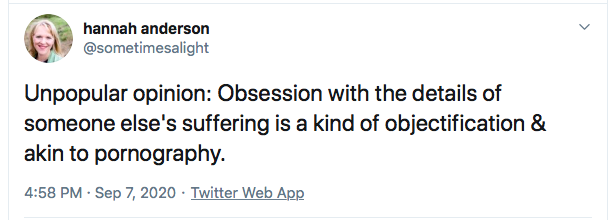I had to stop for a fresh accident today.

By “fresh” I mean close enough to when it happened that the road was still partially blocked, and while the police and ambulance were already there, the fire truck and tow truck were still arriving. Since it occurred in a four-way intersection, the police were directing one lane at a time to move around the wreck. Everyone slowed down to check out what happened. You know, rubbernecking.
I honestly tried hard not to.
When it was my turn to go, I gripped the wheel, stared straight ahead, gave it a little gas, prayed for whoever was involved, and willed myself not to look. Not because I wasn’t curious. It’s just that I’ve been thinking for a few days about the idea of rubbernecking, or whatever it is you call it—gaper(s’) block or curiosity crawl (which might just be a Philly thing).
It’s hard not to try to gain some details on what happened. Our human nature seems to want to stare, to figure out what went wrong, to get in on the drama. We want to know so we can describe it in detail to whomever we see next. We gain glory from devouring someone else’s pain.
We don’t just do this on the road.
We do it at our workplace. We’ve perfected it at our churches (obviously we need to know all the details so we can share them as part of our “prayer request”). We do it through so-called reality shows on TV and People magazine. And now, the easiest and biggest place of all, we do it on the internet.
Social media has allowed us to get up close and personal with people we only knew at a distance. They share their lives (albeit curated) and we devour it. And when something goes wrong and they choose not to provide all those juicy details, the whys and wherefores, we criticize them for it.
On Monday, this tweet popped up in my feed:

That sentence stopped me in my tracks. It seemed a bit extreme. The author went on to explain how our need to find out more information of someone else’s tragedy is a form of voyeurism (like porn is). It excites us to hear all the gory details of another person’s pain or suffering. (You can read the whole thread here: https://twitter.com/sometimesalight/status/1303075232052379657) She talks of how “some people live for drama & will use your suffering for the hit,” almost as if it’s a drug.

When I see how quickly I am tempted to google a tragedy, a famous marriage breakup, a pastor stepping down from a church, to “discover” the details, the “deeper” reason, I know she is right. (Last week a former pastor’s wife felt she had to respond on social media because strangers kept asking—in the comments and through direct messages—what the “deeper reason” was that her husband had stepped down from ministry. It’s a shame she felt she had to do so to shut them up.)
We want the inside knowledge. We want to dissect it. We want to share it with others. We may even “need” to know out of fear—if I understand why this happened to whomever, I’ll know if I have to worry about it happening to me.
But as Hannah says, “We dare not feel entitled to the details of someone else’s pain, even if their telling it would help *us* in some way. Suffering is a sacred thing & only God can tell someone when & how they must share it.”
Yes, “suffering is a sacred thing,” and we should never want to glory in, or get a serotonin hit from, delving into someone else’s pain. We should never want to be the “knowing one,” the pusher, really, dishing out juicy tidbits for the consumption and pleasure of others. God calls it gossip. (And he knows it’s tempting.)
The words of a whisperer are like delicious morsels;
Proverbs 18:8
they go down into the inner parts of the body.
We will always pass accidents. We will continue to see reports of tragedies. We will, unfortunately, also receive news of the fall of famous people. We cannot stop that.
But we can control our own response. We can be people of compassion.
If we are the first on the scene of an accident, of course we stop. We call 911. We hold a hand until professional help and/or family arrives. If one of our actual, in-real-life friends ends up in pain, of course we are called to move closer, to provide comfort and relief. But we don’t press for details. We bring the tissues, the danish, the groceries. We sit in solidarity and silence, offering space. We “weep with those who weep.”
And if we don’t personally know the person (even if we feel like they are our BFF thanks to the internet)?
We pray for them, and for those who actually do know them and will come alongside them to minister to them. We do our best not to crave the details, to need to know what really happened and why. We resist the urge to pass on the information.
Social media is designed to ensure everything is out there for mass consumption. But we don’t need to dig in for every “juicy morsel.” It’s hurtful to the person who has become the object of our lust for information, and it’s not healthy for us.
As Eugene Peterson rephrases Proverbs 18:8 in The Message: “Listening to gossip is like eating cheap candy; do you really want junk like that in your belly?”
Let’s work to reject the addiction to needing to know more. Let’s keep the “junk” out of our belly—and our minds. Instead let’s cultivate a healthy habit of prayer for the wellbeing of others, whoever they are.
An interesting, truthful perspective. Thanks.
Marjorie, I appreciate your making the effort to let me know it had value for you. Thanks!
Thank you for this, Carol! I needed it today!
Thanks for taking the time to comment, Jan. I’m glad it was helpful.
Such wonderful insight. It makes me think about a friend who gobbles up any person or animal suffering she sees on social media and i didn’t quite know how to put that into words and you’ve done it! It also reminds me of my mother who insists on watching every single news program and it ends up making her sick. She tries to make me feel bad that I’m not “informed”.
Vali, I’ve noticed more and more that we crave this kind of voyuerism, finding pleasure in others’ pain and using all we learn for our own benefit. We are addicted to drama. Thanks for letting me know the way I expressed it might be helpful as you interact with people you care about.
An intriguing way to reveal a cultural and church truth about a serious problem today. This is a post I will not soon forget, and will apply to my life. Thank you.
Thanks, Joan, I appreciate your input!
Carol,
How true… And if we are honest a little bit of an ouch. I think it goes along with guarding our hearts and minds. Thank you
It was an ouch for me too, Glenda! Thanks for commenting!
I do this especially if it affirms what I already guessed about the person- like an ‘I told you so’. In politics and people who have chosen to put themselves in the limelight, I think there should also be accountability so I also don’t want things that should be exposed to be hidden. I think what you’re talking about though is more personal pain, and this is a good reminder.